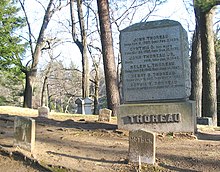|
Helen Thoreau
Helen Louisa Thoreau (22 October 1812 – 14 June 1849)[1] was an American teacher and abolitionist.[2][3] Prominent in New England's anti-slavery circles, she was eulogized by William Lloyd Garrison after her death.[4] Early lifeHelen Louisa Thoreau was born on October 22, 1812, to John and Cynthia Dunbar Thoreau, five months after their marriage.[5][6] She attended Concord Academy, studying English, Latin, painting, and piano.[6] Her art was recognised at the Middlesex County Agricultural Fair.[6] She began teaching in 1829, and put some of her earnings towards her brother Henry’s Harvard tuition.[5][6] AbolitionismHelen was involved in abolitionism throughout the 1830s and 1840s.[5] She acted as secretary of the Middlesex County Anti-Slavery Society, vice president of the Concord Female Anti-Slavery Society, and signed numerous abolitionist petitions.[6] Helen cultivated friendships with prominent abolitionists of the period, including Frederick Douglass and William Lloyd Garrison.[4] In 1842, dismayed by the churches' failure to stand against slavery and conservative ministers' castigation of women's abolitionism, Helen stopped attending services.[7][8] In 1844, Helen, Sophia, and Cynthia Thoreau attended the New England Anti-Slavery convention in Boston.[4] The same year, Helen probably secured Frederick Douglass to speak at a Concord anti-slavery meeting.[6][8] The following year, she worked to resolve a controversy concerning a lecture to be given by radical abolitionist Wendell Phillips at the Concord Lyceum.[4] After two leading figures there sought to prevent Phillips from speaking, Helen and other leading Concord figures demanded a vote.[4] The vote resulted in Phillips being allowed to speak, with Helen writing that it was "a hard battle—but victory at last".[4] Helen Thoreau was described by a colleague in the anti-slavery movement as "endowed by nature with tender sensibilities" and "quick to feel for the woe of others".[6] Death and legacy Helen Thoreau died from tuberculosis in Concord on June 14, 1849.[5] She was eulogized by William Lloyd Garrison in The Liberator, with Garrison writing:
Along with her mother and sister, Helen Thoreau has been acknowledged as a significant abolitionist and a key influence on galvanising her brother Henry's involvement in anti-slavery efforts.[4][8] In a 2001 paper, Sandra Petrulionis wrote that:
References
|
||||||||||||
